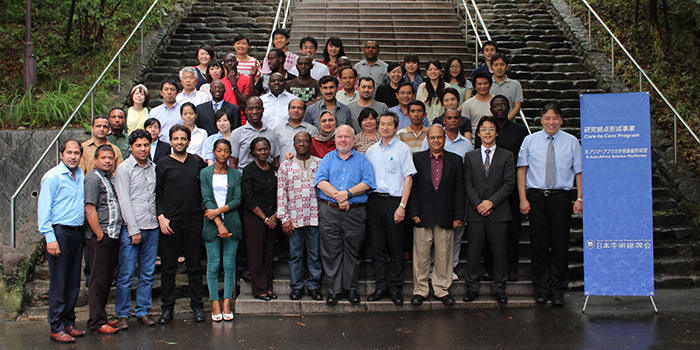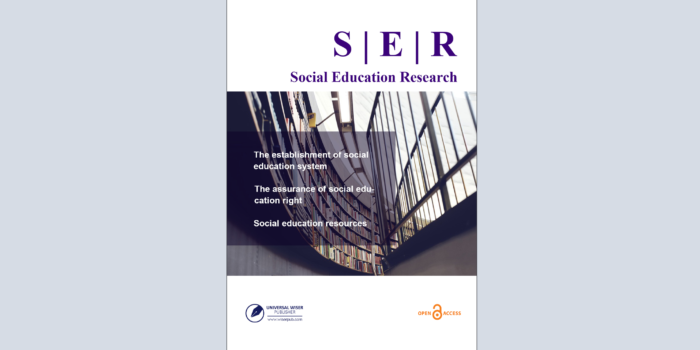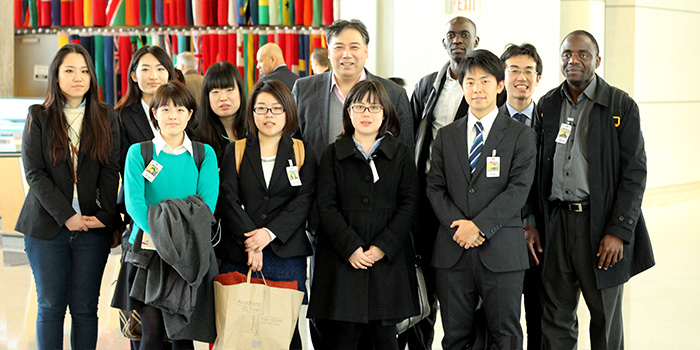On July 7th, 2014, the Second JSPS Core-to-Core Program Seminar on “Study on Education Finance/Administration and International Education Development” was held in Kobe University’s Graduate School of International Cooperation Studies (GSICS). This seminar intended to provide some guidance on this cutting edged research on education finance/administration by six invited international education development experts and scholars, who shared their thoughts and experiences, and they discussed the issues with young researchers, including graduate students.
More than sixty researchers and practitioners from different regions, including Asia, Africa and Middle East participated in this seminar. Kobe University was conducting the JICA’s (Japan International Cooperation Agency) training on “Education Finance and Administration” focused on basic education quality, internal efficiency, and equity from June to July for six weeks, and twenty-seven ministries of education senior officers from fifteen developing countries also participated in this seminar. This seminar consisted of the following two parts: 1) Analysis on Basic Education Finance in Developing Countries; and 2) Analysis on Basic Education Administration in Developing Countries.
 The first part focusing on education finance was opened by Prof. Kazuhiro Yoshida, Professor at Hiroshima University, who shared the latest debate on Post-2015 Education/Development Agenda. He explained the consultative process towards Post-2015 and education overarching goal as “ensure equitable and inclusive quality education and life-long learning for all by 2030”. Pointing out recent international emphasis on “outcomes”, he highlighted that concrete measures were not yet presented, and the difficult challenge to have universal education goal remained. In order to know what works for effective learning, he indicated the needs for evidence-based policy formulation and designing of interventions in close relation with researchers.
The first part focusing on education finance was opened by Prof. Kazuhiro Yoshida, Professor at Hiroshima University, who shared the latest debate on Post-2015 Education/Development Agenda. He explained the consultative process towards Post-2015 and education overarching goal as “ensure equitable and inclusive quality education and life-long learning for all by 2030”. Pointing out recent international emphasis on “outcomes”, he highlighted that concrete measures were not yet presented, and the difficult challenge to have universal education goal remained. In order to know what works for effective learning, he indicated the needs for evidence-based policy formulation and designing of interventions in close relation with researchers.
Second, Dr.Shinsaku Nomura, Education Economist at the World Bank Headquarters,presented on “Financing for Quality Education: Trends and Evidence from South Asia Region”.He introduced emerging evidence from impact evaluations on what inputs increase quality of learning found in South Asia, focusing on several factors including infrastructure, learning materials, teacher salary, teacher quality, school feedings and stipends. The practice of impact evaluation showed mixed evidences and the need in further careful observations.
Third, Dr. James Wokadara,Lecturer at Makerere University in Uganda delivered his presentation on “Analysis of Basic Education Finance in Developing Countries: Evidence from Uganda” He explained Uganda’s decision making mechanisms on education budget at central governmental level, its expenditure trail in primary education sub-sector, as well as the current budget allocation. He also emphasized the importance of borrowing educational practices between and within countries.
 Afterwards, two commentators, Mr. Christian Koramoah, Financial Controller, Ministry of Education in Ghana, and Ms. Thandar Win Khin, Financial Officer, Ministry of Education in Myanmar added the case stories of their representative countries. Mr. Koramoahstated the challenge of selecting effective program and when it comes to implementation process political influences also matter. Ms. Khinpointed that Myanmar had particular issues on low teacher salary and, as a result, teachers have to find second job.
Afterwards, two commentators, Mr. Christian Koramoah, Financial Controller, Ministry of Education in Ghana, and Ms. Thandar Win Khin, Financial Officer, Ministry of Education in Myanmar added the case stories of their representative countries. Mr. Koramoahstated the challenge of selecting effective program and when it comes to implementation process political influences also matter. Ms. Khinpointed that Myanmar had particular issues on low teacher salary and, as a result, teachers have to find second job.
In the second part of the seminar which focused on education administration, Dr. James Williams, Associate Professor at George Washington University in USA, presented on “Some Thoughts on Basic Education Administration in Developing Countries.”He highlighted student-learning oriented approach and questioned what changes in administration are required to shift from school places for all to learning for all.
Second, Dr. Vinay Bhargava,Chief Technical Advisor at Partnership for Transparency Fund (PTF) and former Advisor at the World Bank Headquarters, delivered a presentation on “Improving Governance in Education Finance and Education Administration through Community Engagement.” He explained the importance of encouraging CSOs to engage citizens in programs to increase government transparency and accountability and fight corruption with two projects in the Philippines and Kenya.
Third, Dr. Jun Kawaguchi, Assistant Professor at Osaka University presented his recent research on “Impact on the Change of Teacher Training System in Malawi.”He pointed out that at school level one of the primary concerns was teaching quality. Both parents and teachers are not satisfied with the provided teacher courses. Therefore, parents tend to send their children to private schools.
After the second part of the seminar, two commenters, Ms. Assela Marcellus Luena, Principal Education Officer, Ministry of Education & Vocational Training in Tanzania, and Mr. Liholosi Lisulo, Senior Planning Officer, Ministry of Education, Science, Vocational Training & Early Education in Zambia, provided their comments. The main topic for discussion raised was teacher and school principal quality in both countries.
Moreover, after each part of the seminar, very active discussion was held by receiving comments and questions from the floors.
Related Links
http://www.kobe-u.ac.jp/en/NEWS/event/e2014_07_07_01.html
Related


 The first part focusing on education finance was opened by Prof. Kazuhiro Yoshida, Professor at Hiroshima University, who shared the latest debate on Post-2015 Education/Development Agenda. He explained the consultative process towards Post-2015 and education overarching goal as “ensure equitable and inclusive quality education and life-long learning for all by 2030”. Pointing out recent international emphasis on “outcomes”, he highlighted that concrete measures were not yet presented, and the difficult challenge to have universal education goal remained. In order to know what works for effective learning, he indicated the needs for evidence-based policy formulation and designing of interventions in close relation with researchers.
The first part focusing on education finance was opened by Prof. Kazuhiro Yoshida, Professor at Hiroshima University, who shared the latest debate on Post-2015 Education/Development Agenda. He explained the consultative process towards Post-2015 and education overarching goal as “ensure equitable and inclusive quality education and life-long learning for all by 2030”. Pointing out recent international emphasis on “outcomes”, he highlighted that concrete measures were not yet presented, and the difficult challenge to have universal education goal remained. In order to know what works for effective learning, he indicated the needs for evidence-based policy formulation and designing of interventions in close relation with researchers.




